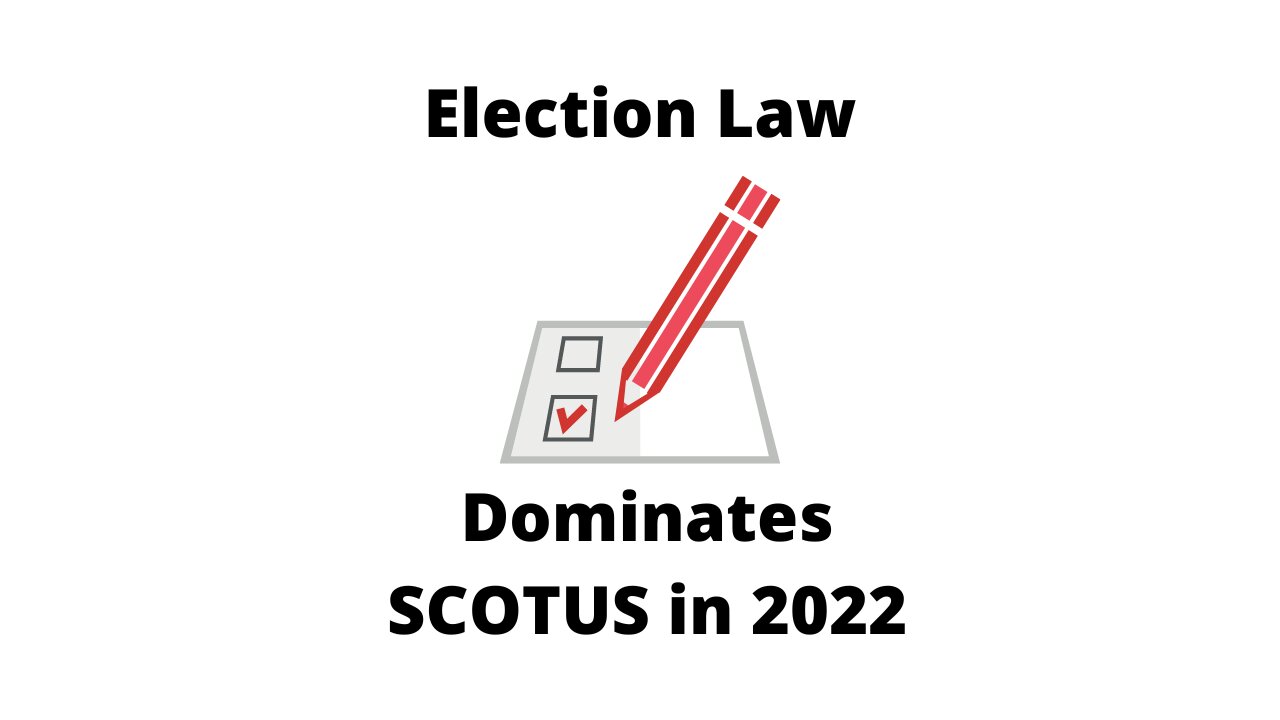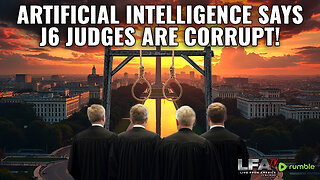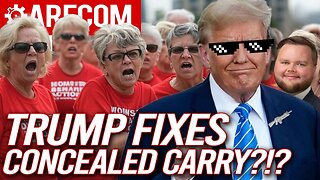Premium Only Content

Election law leads SCOTUS 2022 term
Election law leads SCOTUS 2022 term
By Terry A. Hurlbut
Election law will get the lion’s share of attention during the United States Supreme Court’s 2022 Term. Breathless Court watchers all agree on that. But they do not agree on how far any change in election law could reach. Herewith an analysis of the questions the particular election law case raises, and how the Court might answer them.
Supreme Court 2022 docket look-ahead
The Supreme Court site does not have a comprehensive report of all cases on the docket. Instead it provides a docket search tool. If you know the docket number, the name of either party to the case, or any other word that might show up in the case docket report, you can find the case. Each docket result comes with a link to a one-page PDF document showing what questions the case presents. The database has every case, pending or decided, beginning with the 2001 Term.
Race in admissions
Dylan Stableford at Yahoo! News highlights three cases he, at least, will watch carefully beginning this fall. He begins with Students for Fair Admissions v. Pres. & Fellows of Harvard College (20-1199) and Students for Fair Admissions v. University of North Carolina et al. (21-707). Both cases aim squarely at the precedent in Grutter v. Bollinger (2003). In that case, the Court held that colleges and universities could use race as a factor in admissions. That debate is decades old, and goes back to Regents of University of California v. Bakke (1978). That case held that universities can use race as a factor, but not hold to a rigid quota of slots.
The holding looks suspiciously like the kind of “substantive due process” case that Clarence Thomas already wants to re-examine. Thomas in fact dissented in the Grutter case and no doubt would like to overrule it. The tension, in Grutter and Bakke both, is between Title VI of the Civil Rights Act and the perceived need to create diverse student bodies. Students for Fair Admissions specifically alleges in North Carolina that the university is lowering academic standards to fill slots.
Free speech v. rights of secular customers
Stableford then turns to 303 Creative LLC et al. v. Aubrey Elenis et al. (21-476). In this case, a web site designer plans to create sites celebrating weddings, and give religious messages. But the Attorney General of Colorado stands on the Colorado Anti-discrimination Act. That Act (so says the Attorney General) says she must serve all comers and remain silent about her faith. The Supreme Court agreed to hear her petition on one question only:
Whether applying a public-accommodation law to compel an artist to speak or stay silent, contrary to the artist's sincerely held religious beliefs, violates the Free Speech Clause of the First Amendment.
The Docket Report lists a dizzying number of friend-of-the-court briefs. Alliance Defending Freedom will argue the matter before the Court.
The election law case
The election law case draws the most attention, and for a good reason. It immediately touches redistricting, and whether State courts can interfere with legislatures. But it could also touch the appointment of Presidential electors.
Timeline
The official jaw-breaking case name is Timothy K. Moore, in His Official Capacity as Speaker of the North Carolina House of Representatives, et al., v. Rebecca Harper, et al. Everyone will likely call it by the short name Moore v. Harper (21-1271). The case is on certiorari to the Supreme Court of North Carolina. The reportage on this case comes from MSN, Forbes, and Vox. This case began with the North Carolina Supreme Court rejecting a new Congressional district map from the legislature. That Court, finding that the maps gave the Republicans too great an advantage, substituted their own maps from their own Special Masters.
Speaker Moore asked for an emergency stay of that substitution. The Supreme Court denied the stay, saying it came too late for Midterms. But Justice Kavanaugh, though agreeing the stay application came too late, said the Court should grant certiorari.
I agree with JUSTICE ALITO that the underlying Elections Clause question raised in the emergency application is important, and that both sides have advanced serious arguments on the merits. The issue is almost certain to keep arising until the Court definitively resolves it. Therefore, if the Court receives petitions for certiorari raising the issue, I believe that the Court should grant certiorari in an appropriate case—either in this case from North Carolina or in a similar case from another State. If the Court does so, the Court can carefully consider and decide the issue next Term after full briefing and oral argument.
A broader election law question
Absent the stay, Midterms will go on in North Carolina according to the North Carolina Supreme Court’s Special Masters’ map. But the U.S. Supreme Court might let the legislature go back to its map for the Presidential Election of 2024.
In fact, Speaker Moore filed a question presentation going far beyond the redrawing of district maps. He wants the Court to determine
Whether a State's judicial branch may nullify the regulations governing the “Manner of holding Elections for Senators and Representatives … prescribed … by the Legislature thereof," U.S. CONST. art. I, § 4, cl. 1, and replace them with regulations of the state courts’ own devising, based on vague state constitutional provisions purportedly vesting the state judiciary with power to prescribe whatever rules it deems appropriate to ensure a “fair” or “free” election.
The Constitution and election law
The Constitution (Article I Section 2 Clause 3) says to apportion Representatives among the States according to population. That clause says nothing about who draws the districts. Legislatures infer their power to draw Congressional districts from the Elections Clause (Article I, Section 4, Clause 1). That clause reads:
The Times, Places and Manner of holding Elections for Senators and Representatives, shall be prescribed in each State by the Legislature thereof. But the Congress may at any time by Law make or alter such Regulations, except as to the Places of choosing Senators.
That last part dates back to the old way of choosing Senators: by the legislatures themselves. Not even the Seventeenth Amendment, providing for popular elections of Senators, changes this.
Notice the qualifier in that clause, about how Congress may change a Legislature’s “regulation.” It says to do so by law. Article I Section 7 sets the rules for how a new law comes into being. Laws come from legislatures but go to the relevant executives for approval or disapproval (“veto”). So law here means a joint undertaking by legislature and executive. Laws are subject to court review. Does the “prescription” by a legislature of when, where and how to elect Senators or Representatives qualify as a law? Look carefully: the Constitution doesn’t say that! Could it be that such “prescription” is the sole prerogative of the legislature, and no other authority may gainsay it? (Definition: to gainsay a person or group is to tell them “No.”)
What about Presidential Electors?
Presidential Electors might not seem to be at issue here. But the question, as Speaker Moore worded it, would certainly apply to Electors. Article II, Section 1, Clause 2 begins thus:
Each State shall appoint, in such Manner as the Legislature thereof may direct, a Number of Electors,…
Similarly, the Twenty-third Amendment says the Federal Capital District, which we call the District of Columbia,
shall appoint, in such manner as Congress may direct, a number of Electors…
Here again: where do the words “by law” appear? They do not! Everywhere else the Constitution directs or permits Congress to act, direct, or provide, it always says “by law.” For instance, Congress may by law provide for what happens when neither President nor Vice-President qualifies for office. Similarly, Congress may by law provide for a body, other than the Cabinet, to decide Presidential ability and fitness. But to direct the appointment of Presidential Electors from the District of Columbia? No! And for legislatures to direct the appoint of Presidential Electors from their States? No!
So if not by law, then how? By joint resolution, of course. In fact, no Congress, proposing Constitutional amendments, has ever submitted these to a President for approval or veto. Because again: Article V provides that Congress shall propose. Not “by law propose,” but merely “propose.”
There is your precedent for saying that neither Governor nor State judiciary shall interfere with the legislature in these matters.
The independent legislature theory
Scholars and commentators call this the independent legislature theory. The reportage sources call it a “fringe theory.” But it derives from a careful reading of the Constitution, as amended. If that theory is false, then no Constitutional amendments have ever been valid, because no one sought Presidential approval. Had the Constitution said that the legislatures would by law prescribe “times, places and manner,” courts would have a role.
This calls into question every instance in which legislatures have delegated their district drawing authority to either:
• Their respective Supreme Courts, with or without Special Masters to assist them, or
• Independent redistricting commissions.
The second part might still hold. In Arizona State Legislature v. Arizona Independent Redistricting Commission (2015) the Court essentially held that the legislature, having delegated authority to such a commission, couldn’t un-delegate it so easily.
The record of such commissions is spotty, anyway. Virginia amended its Constitution to create such a commission. But that commission bogged down totally in partisan bickering. Accordingly, the Supreme Court of Virginia appointed two Special Masters to draw districts.
Again, Justice Kavanaugh signaled a willingness to “grant cert.” Indeed the Court did “grant cert” two days ago. (They did so without comment; see the Order List.) Justices Alito, Gorsuch, and Thomas, in addition to Kavanaugh, have shown willingness to consider the Elections Clause and what it implies. Justice Barrett has had no occasion to express an opinion.
Election law implications beyond redistricting
This case began as a redistricting case. To some extent it still is. If the Supreme Court finds for the Speaker, then the legislature’s map takes effect for the Election of 2024. Presumably that map would hold until the 2030 Census.
But, given the Elections Clause, it affects all areas of election law, at least for federal elections. And because North Carolina is not an “off year” State, this affects State and local elections also. (Hypothetically, Louisiana, Mississippi, New Jersey and Virginia could hold State elections according to different rules from Federal. Kentucky could likewise hold its governor’s election by different rules. These are the “off year” States.)
This also affects the appointment of Presidential Electors, because the Electors Clause similarly lacks a by law phrase. Thus legislatures could appoint Presidential Electors directly if they so chose. The federal Constitution being the supreme law of the land (Article VI), no State authority could countermand them.
That thought gives the political left nightmares, if the reportage (especially from Vox) is any indicator. Vox cites a precedent (Davis v.Hildebrandt, 1916) in which popular referendum could supersede the elected legislature. According to that precedent, any body (including the people voting in referendum) having any legislative power, could handle these tasks.
But! The Davis precedent cannot hold to uphold the authority of a court to countermand a legislature. In any case, the Court rejects stare decisis as an inviolable Constitutional principle.
Why the left fears this case
The fears by the Left go far beyond redistricting, though that in itself scares the daylights out of them. They have watched Republicans gain control of more and more legislatures. This upcoming Midterms could wipe the Left out in all but a relative handful of States. And if this wipeout continues to the 2030 Census, they might reasonably fear that they’ll never control the House of Representatives again.
Furthermore, we have already seen the Left try to federalize election law by relying on Congress’ power to
by law make or alter such regulations.
They did so essentially to replace in-person voting with mail-in voting everywhere. That’s because everyone who cares to observe, can see that mail-in ballots skew left. Your editor showed that by running a Chi-Square test on last year’s governor’s race in Virginia. The left knows that mail-in ballots skew left, and are counting on that.
And by the same token, the left wants to federalize the drawing of Congressional districts. In Moore v. Harper the Supreme Court could forbid the left to do either thing.
The Left cannot federalize the appointment of Presidential Electors. Article II has no “make or alter” phrase within it. But they fear the direct appointment option greatly. Otherwise they would have laughed off the alleged email correspondence of Virginia Lamp Thomas (Mrs. Justice) with Arizona legislatures, urging them to appoint Arizona’s Electoral College delegation directly. The Moore case could legitimatize that – exactly what they do not want.
Who is Rebecca Harper?
Rebecca Harper, the respondent in this case, is a member of Common Cause North Carolina. She sued the North Carolina legislature – twice – over Congressional district maps. (Common Cause v. Lewis and Harper v. Lewis.) The arguments by Common Cause scarcely rate a mention. Absolutely any districting map, that does not afford the Democratic Party an advantage, is “gerrymandered,” according to the Left. Never once have they owned up to their own history of “gerrymandering” in the latter half of the twentieth century. Nor do they propose any workable alternative. CNAV has made such a proposal. Among other things it provides that boundaries for Congressional or legislative districts should never cross county or other unit lines. Such a change would make much more sense to a voter.
Nor has Common Cause proposed any election reform that addresses election integrity or security. A quick perusal of their Web site suggests they would favor federalizing elections and issuing mail-in ballots automatically to everyone. They use the same buzzphrases, like “voter suppression,” that the Left uses.
As the named plaintiff in Harper v. Lewis, she becomes the chief respondent in Moore v. Harper.
On to argument
The Supreme Court grants certiorari on a vote of four Justices, the one time the majority does not rule. We do not know how the Court voted in the Moore case, because the Order List doesn’t tell us. The breathless left thinks they know who voted to grant cert in this case, but only by examining earlier opinions.
In any event, the Court will hear argument next Term. The Court conferenced this case three times before the grant, according to the Docket Report.
Common Cause has already briefed the Court in opposition to Speaker Moore’s petition. Rebecca Harper is taking part separately and apart from Common Cause, and has retained one of the Left’s favorite lawyers. That would be Mark Elias, of the Elias Law Group, Seattle, Washington. Respondents also include an outfit called the North Carolina League of Conservation Voters. What interest does an environmental group have in an election law dispute? One would have to ask them. But even now they devote a significant portion of their home page to this case and the dispute behind it.
That’s a lot of heavy hitters, against Speaker Moore and his best Friend of the Court, the National Republican Redistricting Trust. This group is litigating two redistricting cases in North Dakota as we speak. One (Walen v. Burgum) is already on appeal to the Supreme Court (though it is not yet docketed). So Kavanaugh is right: the Court can’t wait.
How will these cases play out? Stay tuned.
Link to:
The article:
https://cnav.news/2022/07/02/foundation/constitution/election-law-leads-scotus-2022-term/
The Docket Search Tool
https://www.supremecourt.gov/docket/docket.aspx
Moore v. Harper Docket Report
https://www.supremecourt.gov/search.aspx?filename=/docket/docketfiles/html/public/21-1271.html
The Constitution
https://www.archives.gov/founding-docs/constitution-transcript
Amendments 11-27
https://www.archives.gov/founding-docs/amendments-11-27
The Order List:
https://www.supremecourt.gov/orders/courtorders/063022zor_5he6.pdf#page=6
Chi-Square test showing mail-in ballots skew left
https://cnav.news/2022/01/05/accountability/executive/mail-in-ballots-election-reform/
Proposal for reforming the election of legislatures and drawing of all districts
https://cnav.news/2021/11/05/accountability/legislative/legislatures-model/
Conservative News and Views:
https://cnav.news/
The CNAV Store:
https://cnav.store/
BitNext:
https://bitnext.app/landing/
-
 19:19
19:19
Declarations of Truth
14 days agoThe JFK Files and what they tell us
1111 -
 LIVE
LIVE
Wahzdee
2 hours agoPUBG is 8 Years Old & Still Beats Every Other BR 🤷♂️🎯
584 watching -
 LIVE
LIVE
PudgeTV
7 hours ago🟠 Gaming on Rumble | Assassins Creed: Odyssey
63 watching -
 7:12
7:12
MichaelMotamedi
17 hours ago $0.60 earnedInside the Sacred World of Rastafarian Food
6.07K4 -
 11:24
11:24
LFA TV
1 day agoARTIFICIAL INTELLIGENCE SAYS J6 JUDGES ARE CORRUPT!
8.02K4 -
 9:02
9:02
ARFCOM News
15 hours ago $0.93 earnedTrump Fixes Concealed Carry | Time Travelling Judge | DoJ Goes After CA Infringements
7.53K2 -
 18:05
18:05
Mrgunsngear
14 hours ago $1.87 earnedHeckler & Koch VP9A1 K Review: The Best Do All Handgun?
9.61K4 -
 14:40
14:40
Clownfish TV
13 hours agoDisney Getting DESTROYED by YouTube...
7.69K3 -
 10:28
10:28
ariellescarcella
13 hours agoThis Is NOT A Normal Face : The Psychology Behind Woke Manipulation
5.99K2 -
 57:56
57:56
CharLee Simons Presents Do Not Talk
2 days agoHow to Win the Minds of the APATHETIC RIGHT with Joe Ming & Sam Anthony
4.9K